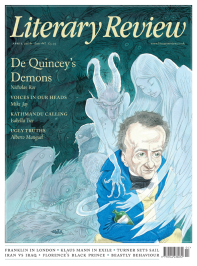Gerald Butt
State of Unrest
The Egyptians: A Radical Story
By Jack Shenker
Allen Lane 510pp £15.99
The recent discovery outside Cairo of the body of the Italian academic Giulio Regeni, believed to have been tortured and killed by the security services, alerted the world to something Egyptians were already well aware of: human rights and democracy are in an even worse state under President Abdel Fattah al-Sisi’s rule than they were under Hosni Mubarak. Since Mubarak’s overthrow during the popular uprising of 2011, Egypt has had two presidential elections, two parliamentary elections and three referendums. Yet with thousands of Muslim Brotherhood supporters imprisoned and street protests banned, Egyptians enjoy few of the fruits of democracy.
In other words, despite the vast and euphoric outpouring of public emotion in 2011, the autocratic tradition has survived unscathed. Perhaps this is not surprising, for it has been ingrained in Egyptian political life since the revolution in 1952 that turned the country from a monarchy into a republic. Anwar Sadat, Egypt’s president from 1970 until his assassination in 1981, recalled in his memoirs how the coup leaders discussed what system of government to implement. Sadat never had any doubts about this, arguing that ‘what may be achieved “democratically” in a year can be achieved “dictatorially” in a day’. And so it has been since then, with Egyptians strictly excluded from the governing process.
The theme of exclusion runs through Jack Shenker’s riveting and elegantly written account of the final days of the Mubarak regime and the subsequent turmoil. As a correspondent based in Cairo he witnessed the events unfolding, not from the comfort of his office but out on the streets, experiencing first-hand

Sign Up to our newsletter
Receive free articles, highlights from the archive, news, details of prizes, and much more.@Lit_Review
Follow Literary Review on Twitter
Twitter Feed
In 1524, hundreds of thousands of peasants across Germany took up arms against their social superiors.
Peter Marshall investigates the causes and consequences of the German Peasants’ War, the largest uprising in Europe before the French Revolution.
Peter Marshall - Down with the Ox Tax!
Peter Marshall: Down with the Ox Tax! - Summer of Fire and Blood: The German Peasants’ War by Lyndal Roper
literaryreview.co.uk
The Soviet double agent Oleg Gordievsky, who died yesterday, reviewed many books on Russia & spying for our pages. As he lived under threat of assassination, books had to be sent to him under ever-changing pseudonyms. Here are a selection of his pieces:
Literary Review - For People Who Devour Books
Book reviews by Oleg Gordievsky
literaryreview.co.uk
The Soviet Union might seem the last place that the art duo Gilbert & George would achieve success. Yet as the communist regime collapsed, that’s precisely what happened.
@StephenSmithWDS wonders how two East End gadflies infiltrated the Eastern Bloc.
Stephen Smith - From Russia with Lucre
Stephen Smith: From Russia with Lucre - Gilbert & George and the Communists by James Birch
literaryreview.co.uk